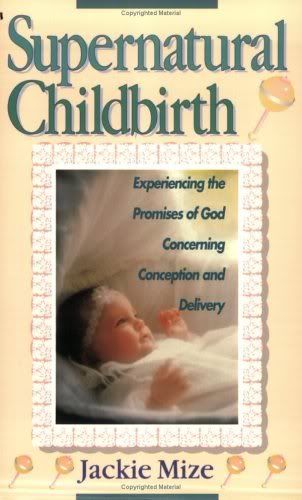
Supernatural Childbirth
I struggle with the book because I want so badly to believe the author's conclusions. However, I can find no confirmation in scripture that the author's conclusions are correct.
Let me start by saying that I do not presume to question the truth of the author's own personal experiences with conceiving and child bearing. Nor do I doubt the testimonies of the women included. I do not doubt her sincerity in her belief. I will even go so far as to say that I believe it's possible that God worked the way He did in the author's life for exactly the reasons she thinks He did. However, I draw the line at the author's use of her personal story as a prescription for all Godly child bearing. She boldly claims "If it will work for us, it will work for you." Later in the same passage she claims that she won't even argue about it, and that she's right because her claims are supported by scripture. I do not believe that any interpreter has the monopoly on understanding the meaning in purpose in Holy scripture.
The author, Jackie Mize, is the mother of 4 living children and 1 miscarried child. After her first miscarriage, she sought comfort in the Word and came to the conclusion that it was God's will for her to have children and she could triumph over any physical failures in conceiving or carrying a baby by claiming various passages in scripture as promises for her life and fertility and commanding her body to obey. She went on to have 4 successful pregnancies and 3 pain-free deliveries.
She uses the term "Supernatural" in this way:
When I refer to supernatural childbirth, I’m talking strictly about being able to conceive and to have babies with a pregnancy free from nausea, morning sickness, pain, moodiness, depression and without fear of any kind; then going through the entire labor without pain, and through the delivery without stitches and anesthetic. I’m talking about using the Word of God to overcome, change and make things better.
I will confess my own bias and say that I am not a charismatic believer. The spirit has never moved me in that way and the walk He has called me to is different in mode than the walk of those He has gifted more charismatically. As it is with anything unknown, I was initially leery of the author's assertions based on ignorance alone.
However, it is my sincere belief after lengthy consideration that my objections are founded on spiritual truths and not on prejudices.
The fundamental problem with Ms. Mize's basic thesis is the underlying assumption that it is God's will that every woman who wants a child would have one. Translated: it is God's will that we should have whatever we want. In one support of her claim, the author writes,
...Every barren woman in the Bible who was godly and believed Your Word became pregnant; You opened her womb and blessed her.
This begs the question: what then of the woman who wants children but has none?
The hermeneutic problem with the author's proof-text approach is that it is based on the logical fallacy of an argument from silence. It assumes that Sarah, Rebekah, Leah, Rachel, Hannah, Manoah's Wife, the Sunammite Woman, and Elisabeth are an exhaustive list of every barren woman in Israel when there is absolutely no text to support that, nor does assuming so make any logical sense. If one assumed that, one would also have to assume that every person, miracle and teaching in the Bible was exhaustive. Else, how would the distinction between what is exhaustive and what is selective be made? I am positive that in the whole of the spans of time covered by the scripture there were more godly citizens, miracles, encounters with God, testimonies, and teachings that we will ever know. God's power throughout history is not limited to what is contained in 1500 pages of text.
The notion that God exacts his favor on man based on the man's works is clearly contradicted in scripture. In the author's context, a man's very faith is a work that he improves and builds of his own will and capacity. She writes, "The reason it worked for us is we found it in God's word and kept reading, studying and talking it until it was part of us. And that's what will make it work for you." Essentially, they willed it so. She even assigns value judgments to women, dividing them as "average," "above average" and "below average" in God's kingdom. There is no scriptural evidence that God's economy works this way.
She also claims "by His stripes we are healed" as a proclamation of power over cancer, migraines, stomach aches and childbearing. She even goes so far as to say "If we're redeemed, we're redeemed; either we are or we're not!" The logical extension of this is that any measure of pain in a person's life is either a failure of Christ's redemptive power, or an indication of an incomplete faith in the believer. Were pain proportionate to faith, Paul, John, Stephen and Christ himself would have ascended to glory pain-free.
Additionally, the author's basic premise would have to extend to the conclusion that a childless couple is not manifesting God's will, or is following it less well than the couple with children. By this conclusion God's ability to exact His will on earth is limited by the power and faith of mortals. God's performance in the midst of pain and suffering is less perfect than His work in lives where there is no pain.
If it is genuinely true that there is no place in God's kingdom for pain and suffering, then what of the suffering of Job, David, Christ and the apostles? How beautiful is Job's faith in God in the midst of his struggles! How precious are David's psalms of heartfelt honesty! How urgent are the Apostles' pleadings that we persevere for sake of Christ!
God's glory is vast, and His power to redeem is unending. God can manifest His glory through pain, through jubilation, and through everything in between. He can redeem any broken body, but it does not follow that redemption is always earthly healing. How arrogant of us to limit God in such a way. If it is the case that His glory will be made manifest more in brokenness than in health, may it never be so that we attempt to stand in His way! We are told that God's ways are not our ways. Therefore how can we claim to know the exhaustive list of the manners, modes and circumstances in which He might choose to make His glory known?
While I appreciate the author's courage in addressing the issue at all, and the sincerity of her beliefs, there is little in this book to recommend it to anyone looking to read it for any other purpose than mere curiosity and exposure to alternate ideas.
Recommended: No


